TV series Blossoms Shanghai fuelling city's consumption boom: Will it last?
One of Shanghai's commercial areas has seen a boost in consumption since the New Year, partly driven by the popularity of the Blossoms Shanghai television series. Even as consumption returns to pre-pandemic levels, officials will need to do more to ensure that this recovery remains sustainable over the long term. Lianhe Zaobao correspondent Chen Jing tells us more.

In the days leading up to the Chinese New Year, people thronged Huanghe Road in Shanghai.
Despite the near-freezing winter winds, long queues of people looking to buy pastries formed outside Park Hotel Deli on one side of the road, and Xinghualou restaurant on the other. Around the corner, the police had to deploy additional manpower to maintain order as large crowds gathered in front of Tai Sheng Yuan Restaurant to take photos and "check-in".
'Blossoms Shanghai vogue'
A face among the crowd was Xiao Yao, a Shanghai white-collar worker who also came to "check-in". She told Lianhe Zaobao that after the airing of popular television series Blossoms Shanghai (《繁花》), the "Zhi Zhen Yuan" restaurant depicted in the drama, which is based on the actual Tai Sheng Yuan restaurant, became the latest attraction for netizens.
She had intended to go to Park Hotel Deli to buy the butterfly pastry that was featured in the drama, but gave up after finding out that the queue was four hours' long.
"Even under normal circumstances you would have to queue to get a butterfly pastry, but after Blossoms Shanghai, there are more 'competitors' for the pastry," she shared.
Blossoms Shanghai is a television drama set in Shanghai and presented in Shanghainese. Although the season finale was aired in early January, the buzz generated by the show still persists.
Shanghai businesses and business districts are coming up with various ways to spur consumption while leveraging the roaring popularity of Blossoms Shanghai...
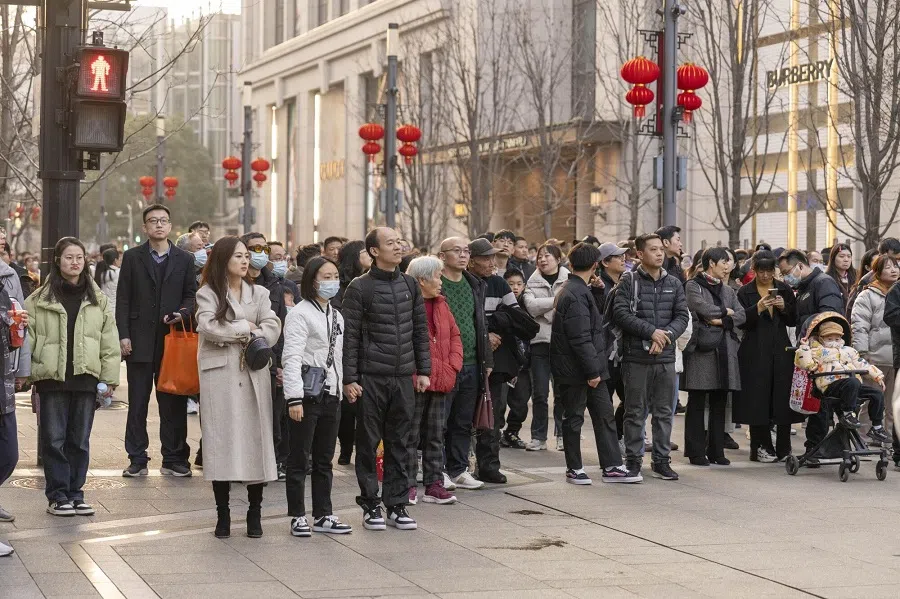
Dishes featured in the drama such as pork ribs with rice cakes, beef fried rice noodles and paofan (cooked rice served in soup) have seen a huge increase in sales, with many tourists flocking to Huanghe Road and Jinxian Road. Brought on by the "Blossoms Shanghai vogue", Shanghai's consumer market started 2024 with a bang.
According to data from the Consumer Market Big Data Laboratory, during the period around New Year's Day this year, Shanghai's onsite consumer payments reached 25.56 billion RMB (US$3.55 billion), an increase of 38.7% year-on-year. Thirty-five key business districts also saw a surge in footfall, up to 15.48 million people, an increase of 80% year-on-year.
Leveraging Blossoms Shanghai to spur consumption
Shanghai businesses and business districts are coming up with various ways to spur consumption while leveraging the roaring popularity of Blossoms Shanghai, hoping that this wave of consumption that has not been seen for a while will persist, and not just be a flash in a pan.
Food delivery platform Meituan unveiled its Blossoms Shanghai-themed food event from 28 December to 27 January, offering discount coupons for those who place orders for the dishes featured in the show. Review platform Dianping also launched an event to "follow Blossoms Shanghai in a food expedition of Shanghai", listing the places featured in the drama that are worth a visit, while also promoting products offered by partnering businesses. The wildly popular Tai Sheng Yuan restaurant also offered set meals of local Shanghai delicacies that could be purchased online via group-buying on Dianping.
During the Chinese New Year festive market at the Nanjing Road pedestrian street, elements from Blossoms Shanghai can also be spotted everywhere. At the centre of the 2,000-square-metre market, a feature wall depicting the sights of Nanjing Road during the era portrayed in Blossoms Shanghai was set up for visitors to take photos and "check-in". Market visitors could also sample food items featured in the show such as pork ribs with rice cakes and dingsheng cake (定胜糕, lit. victory cake, a traditional steamed cake made from rice flour).
The latest statistics as of 15 February showed that weekly sales figures for business districts around the pedestrian street on Nanjing Road grew 11% year-on-year and 31% compared with 2019.
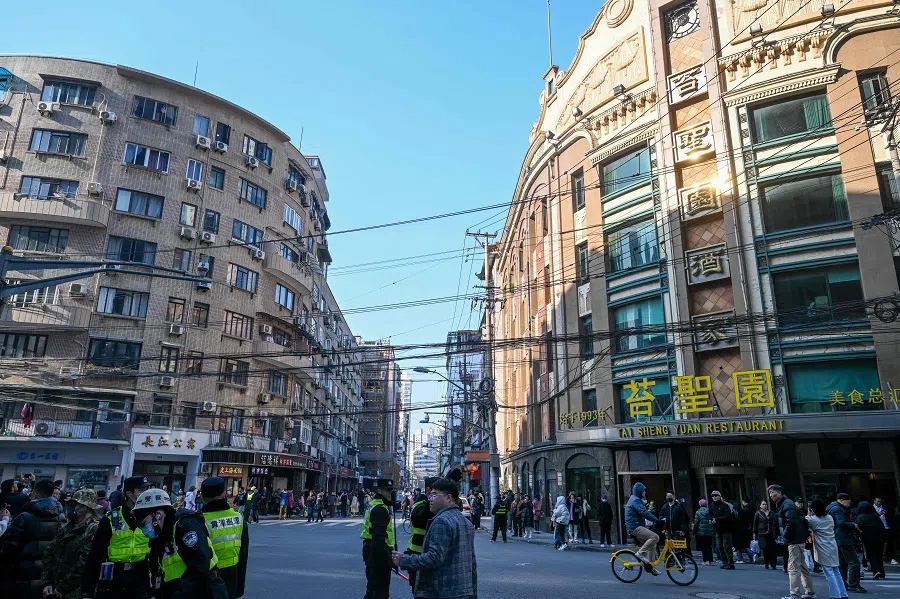
Wang Gang, general manager of the Shanghai Nanjing Road Pedestrian Street Business Management Company Limited, said that since opening on 20 January, the market has attracted 40,000 visitors per day at its peak. Besides traditional stalls, the market also has pop-up stores selling blind boxes, anime-related products as well as sports brands.
"This is the first time that Nanjing Road is hosting such a market, and we hope to build on what we have while also offering something new, attracting even more customers who originally would not visit Nanjing Road," Wang said.
During an interview, Zhu Lin, market head for New World Company Limited, which operates several shopping malls on Nanjing Road, stated that in a bid to spur consumption, Nanjing Road had undergone a transformation since New Year's eve, with shops along the street no longer operating independently like in past years, instead collectively extending their opening hours till past midnight. This brought increased sales revenue by 30% year-on-year for Nanjing Road, basically returning to the pre-pandemic level.
The latest statistics as of 15 February showed that weekly sales figures for business districts around the pedestrian street on Nanjing Road grew 11% year-on-year and 31% compared with 2019. Sales for the department stores, hotels, food and beverage, and restaurants all fared better than their pre-pandemic figures.
Shanghai's average propensity to consume (per capita consumption divided by per capita income) was only 61.9%, far below the national average of 68.3%, signalling that consumer confidence is still low.
The 'Year of Consumption Promotion'
Although Shanghai reached a record 1.85 trillion RMB in retail sales of consumer goods in 2023, up 12.6% year-on-year and ranking first among other Chinese cities, Shanghai's average propensity to consume (per capita consumption divided by per capita income) was only 61.9%, far below the national average of 68.3%, signalling that consumer confidence is still low.
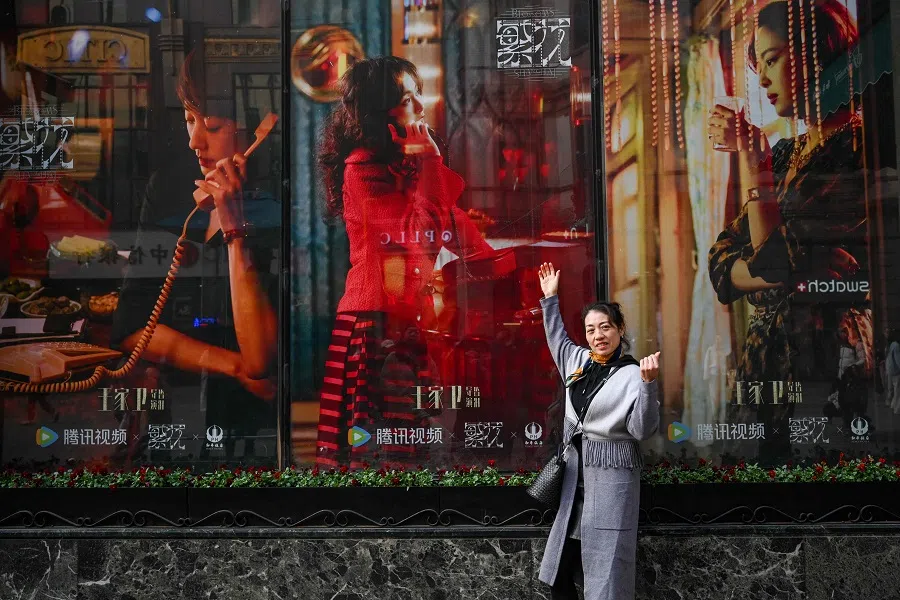
After Shanghai failed to achieve its economic growth target for two consecutive years, the Shanghai Federation Of Industry And Commerce (SFIC) proposed at the Shanghai Municipal Committee of the Chinese People's Political Consultative Conference meeting in January that officials could hand out consumption vouchers totalling 1% of Shanghai's economic output, that is, 47.2 billion RMB, to spur economic growth of 1.5% and above.
The SFIC pointed out that numerous industries are not doing well after the pandemic and the employment situation has also become grimmer, while slowing income growth has also led to elevated economic uncertainty.
Amid downward pressure on the economy, residents are more inclined to save and reluctant to spend on non-essential items. The desire to invest in consumer goods companies has also fallen drastically; even if investments are made, they are merely defensive ones. SFIC noted, "The society has turned more conservative, forming a 'negative cycle' in boosting and expanding consumption."
After Shanghai's Covid-19 lockdown ended in 2022, officials issued e-coupons totalling 1 billion RMB in three batches over three months. But based on my understanding, Shanghai has no plans to issue citywide consumer vouchers this year.
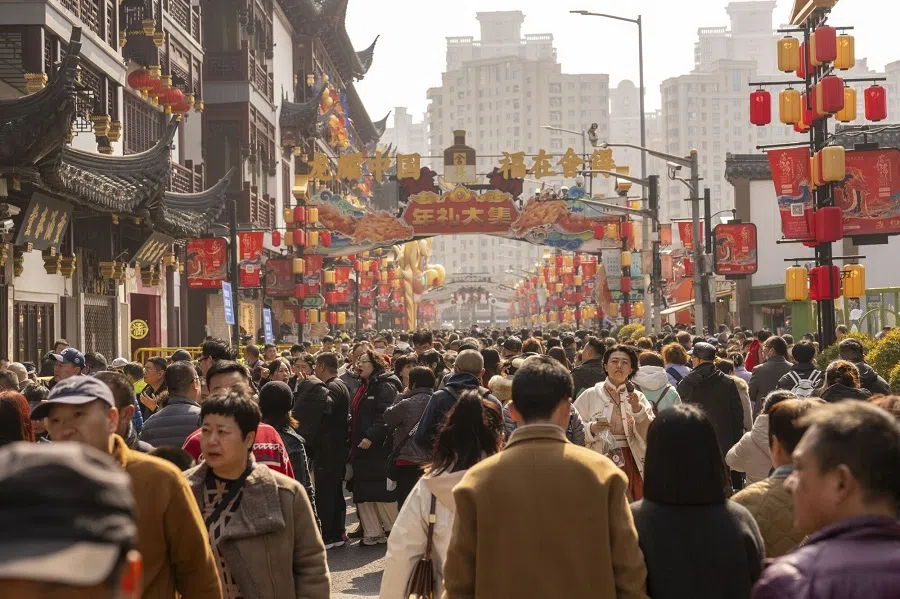
Boosting consumption is not just a major task for Shanghai this year, but for China as a whole. China's economy grew 5.2% in 2023, of which consumption accounted for over 80% of growth. The Chinese Ministry of Commerce has designated 2024 as the "Year of Consumption Promotion", focusing on the sale of big-ticket items such as automobiles and household appliances.
However, Christine Peng, head of the Greater China Consumer Sector at UBS, predicts that retail sales are expected to increase 5.5% in 2024, one percentage point lower than the estimated 6.5% rise last year. She pointed out at a forum earlier in the year that the two biggest obstacles facing Chinese consumption at the moment are real estate and local debt.
"If cash is to be handed out, it should be given to vulnerable groups such as the farmers first, so that the marginal propensity to consume will be higher." - Lu Ting, Chief China Economist, Nomura
Wealth effect and consumption habits
Lu Ting, chief China economist at Nomura, also pointed out in January during a public forum that the first challenge facing the Chinese economy this year could be a significant slowdown in consumption. This is partly because the revenge spending boom last year formed a higher base for comparison, putting downward pressure on consumption. Also, based on housing and stock prices, it seems that the wealth effect is diminishing.
However, Lu thinks that the opportune time to issue consumption vouchers or cash hand-outs has passed; relying heavily on these measures will not solve the root problem but instead lead to a fiscal cliff and an abrupt economic slowdown. He said, "If cash is to be handed out, it should be given to vulnerable groups such as the farmers first, so that the marginal propensity to consume will be higher."
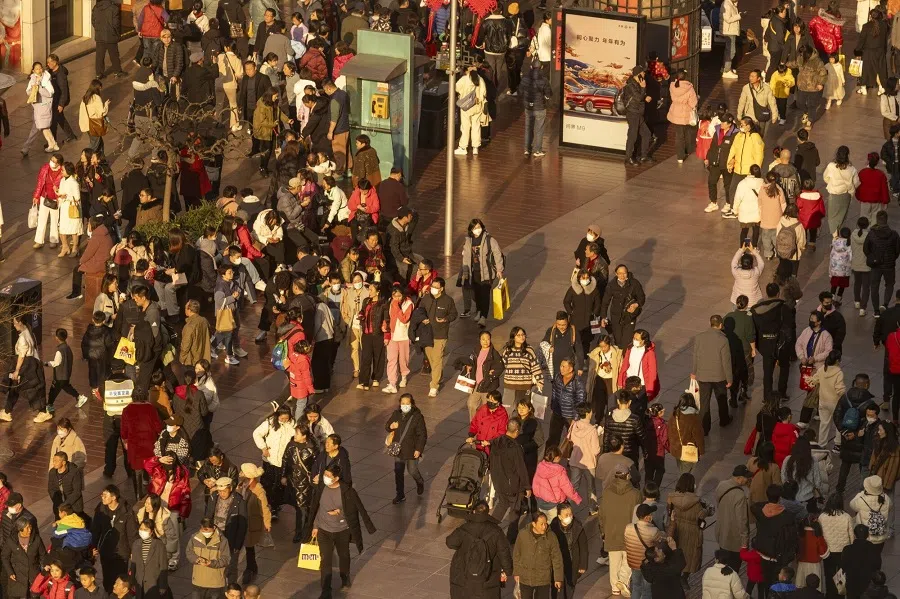
Shanghai's Nanjing Road kicked off the new year with two rounds of shopping coupon handouts. Zhu pointed out that the coupons distributed during the first round were mostly 100 RMB vouchers at the cost of 70 RMB, which customers said could "hardly satisfy their needs". During the second round of handouts, 500 RMB vouchers at the cost of 350 RMB were issued, and the results significantly improved. Over 85% of coupons issued were used in this round of handouts that ended on 3 February, demonstrating that "people do not lack consumer demand; they just need targeted stimulation".
He also acknowledged that as China signs more mutual visa exemption agreements with countries around the world, people will be able to travel more freely, and the sale of luxury goods on Nanjing Road is expected to take a hit this year. But this also implies that more foreign tourists will travel to Shanghai, presenting new opportunities for businesses along the pedestrian street.
"We have already negotiated with banks to increase the credit card limit for the convenience of foreign consumers, and we are planning another round of large-scale promotions in the summer to sustain consumption enthusiasm," he said.
This article was first published in Lianhe Zaobao as "上海开年促消费 不让"繁花"变昙花".





